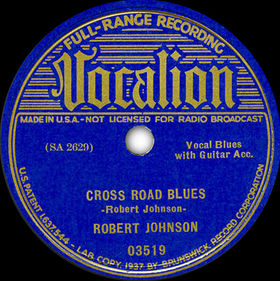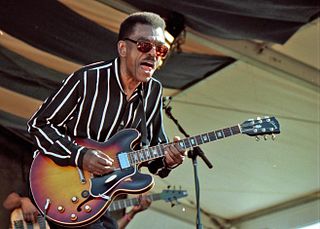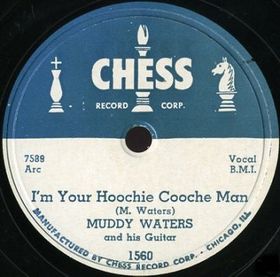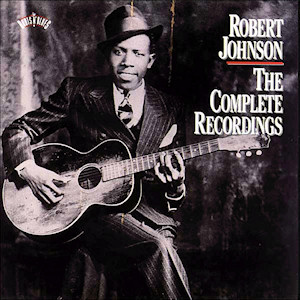
Robert Leroy Johnson was an American blues musician and songwriter. His landmark recordings in 1936 and 1937 display a combination of singing, guitar skills, and songwriting talent that has influenced later generations of musicians. Although his recording career spanned only seven months, he is recognized as a master of the blues, particularly the Delta blues style, and as one of the most influential musicians of the 20th century. The Rock and Roll Hall of Fame describes him as perhaps "the first ever rock star".

"Love in Vain" is a blues song written by American musician Robert Johnson. Johnson's performance – vocal accompanied by his finger-style acoustic guitar playing – has been described as "devastatingly bleak". He recorded the song in 1937 during his last recording session and in 1939 it was issued as the last of his original 78 rpm records.

"Kind Hearted Woman Blues" is a blues song recorded on November 23, 1936, in San Antonio, Texas, by the American Delta bluesman Robert Johnson. The song was originally released on 78 rpm format as Vocalion 03416 and ARC 7-03-56. Johnson performed the song in the key of A, and recorded two takes, the first of which contains his only recorded guitar solo. Both takes were used for different pressings of both the Vocalion issue and the ARC issue. The first take (SA-2580-1) can be found on many compilation albums, including the first one, King of the Delta Blues Singers (1961). Take 2 (SA-2580-2) can be heard on the later compilation Robert Johnson, The Complete Recordings (1990).

"Fixin' to Die Blues" is a song by American blues musician Bukka White. It is performed in the Delta blues style with White's vocal and guitar accompanied by washboard rhythm. White recorded it in Chicago on May 8, 1940, for record producer Lester Melrose. The song was written just days before, along with eleven others, at Melrose's urging.

"Cross Road Blues" is a song written by the American blues artist Robert Johnson. He performed it solo with his vocal and acoustic slide guitar in the Delta blues style. The song has become part of the Robert Johnson mythology as referring to the place where he sold his soul to the Devil in exchange for musical genius. This is based largely on folklore of the American South that identifies a crossroads as the site where Faustian bargains can be made, as the lyrics do not contain any references to Satan.

"Sweet Home Chicago" is a blues standard first recorded by Robert Johnson in 1936. Although he is often credited as the songwriter, several songs have been identified as precedents. The song has become a popular anthem for the city of Chicago despite ambiguity in Johnson's original lyrics. Numerous artists have interpreted the song in a variety of styles.

Sylvester Johnson was an American blues and soul singer, musician, songwriter and record producer. His most successful records included "Different Strokes" (1967), "Is It Because I'm Black" (1969) and "Take Me to the River" (1975).

"Rollin' and Tumblin'" is a blues standard first recorded by American singer-guitarist Hambone Willie Newbern in 1929. Called a "great Delta blues classic", it has been interpreted by hundreds of Delta and Chicago blues artists, including well-known recordings by Muddy Waters. Rock musicians usually follow Waters' versions, with the 1960s group Cream's rendition being perhaps the best known.

"Stop Breaking Down" or "Stop Breakin' Down Blues" is a Delta blues song recorded by Robert Johnson in 1937. An "upbeat boogie with a strong chorus line", the lyrics are partly based on Johnson's experience with certain women:

"Dust My Broom" is a blues song originally recorded as "I Believe I'll Dust My Broom" by American blues artist Robert Johnson in 1936. It is a solo performance in the Delta blues-style with Johnson's vocal accompanied by his acoustic guitar. As with many of his songs, it is based on earlier blues songs, the earliest of which has been identified as "I Believe I'll Make a Change", recorded by the Sparks brothers as "Pinetop and Lindberg" in 1932. Johnson's guitar work features an early use of a boogie rhythm pattern, which is seen as a major innovation, as well as a repeating triplets figure.

"Hoochie Coochie Man" is a blues standard written by Willie Dixon and first recorded by Muddy Waters in 1954. The song makes reference to hoodoo folk magic elements and makes novel use of a stop-time musical arrangement. It became one of Waters' most popular and identifiable songs and helped secure Dixon's role as Chess Records' chief songwriter.

"Come On in My Kitchen" is a blues song by Robert Johnson. Music writer Elijah Wald has described it as "a hypnotic lament" and "his first unquestionable masterpiece".

"Little Red Rooster" is a blues standard credited to arranger and songwriter Willie Dixon. The song was first recorded in 1961 by American blues musician Howlin' Wolf in the Chicago blues style. His vocal and slide guitar playing are key elements of the song. It is rooted in the Delta blues tradition and the theme is derived from folklore. Musical antecedents to "Little Red Rooster" appear in earlier songs by blues artists Charlie Patton and Memphis Minnie.

The Complete Recordings is a compilation album by American Delta blues musician Robert Johnson. The 41 songs were recorded in two sessions in Dallas and San Antonio, Texas for the American Record Company (ARC) during 1936 and 1937. Most were first released on 78 rpm records in 1937. The Complete Recordings, released August 28, 1990, by Columbia Records, contains every recording Johnson is known to have made, with the exception of an alternate take of "Traveling Riverside Blues".

"I Wonder Where My Easy Rider's Gone?" is a ragtime/blues song written by Shelton Brooks in 1913. Sometimes categorized as hokum, it led to an answer song written in 1915 by W.C. Handy, "Yellow Dog Rag", later titled "Yellow Dog Blues". Lines and melody from both songs show up in the 1920s and 1930s in such songs as "E. Z. Rider", "See See Rider", "C. C. Rider", and "Easy Rider Blues".
"Ramblin' on My Mind" is a blues song recorded on November 23, 1936, by Delta blues musician Robert Johnson. He recorded two takes of the song, which were used for different pressings of the 78 rpm records issued by both the Vocalion and ARC record companies.
"Walkin' Blues" or "Walking Blues" is a blues standard written and recorded by American Delta blues musician Son House in 1930. Although unissued at the time, it was part of House's repertoire and other musicians, including Robert Johnson and Muddy Waters, adapted the song and recorded their own versions.

"Key to the Highway" is a blues standard that has been performed and recorded by several blues and other artists. Blues pianist Charlie Segar first recorded the song in 1940. Jazz Gillum and Big Bill Broonzy followed with recordings in 1940 and 1941, using an arrangement that has become the standard.
"Milk Cow Blues" is a blues song written and originally recorded by Kokomo Arnold in September 1934. In 1935 and 1936, he recorded four sequels designated "Milk Cow Blues No. 2" through No. 5. The song made Arnold a star, and was widely adapted by artists in the blues, Western swing and rock idioms.















